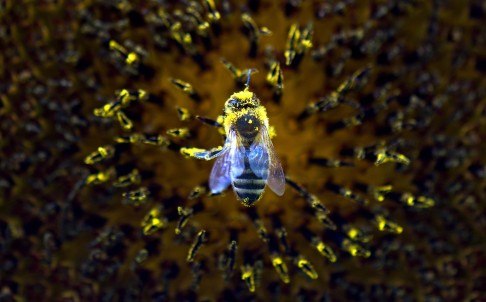Despite being natural-born royalists, Asian honey bees have anarchic tendencies – more so than their Western counterparts – and a colony can survive for months without a queen, according to a joint study by scientists from China and Australia.
When a queen bee dies, her daughters select a lucky egg and feed it with royal jelly in hope of creating a suitable replacement.
But the egg doesn’t always hatch.
"When that happens, the workers (daughters) lose hope and give up any attempt to resurrect their lost queen,” said Professor Tan Ken, who helped lead the research.
“Just like human society, the bee colony would then enter a state of anarchy, and our job is to find out how the individual bees respond to this shifting paradigm,” added Tan, who works for the Chinese Academy of Sciences' Xishuangbanna Tropical Botanical Garden in southwest China’s mountainous Yunnan province.
Previous studies conducted overseas on Western honey bees found that some workers activated their dormant ovaries to produce offspring when their queen, who usually gives birth to the entire beehive, dies.
Tan's team observed a similar phenomenon among Asian honey bees, but to a greater extent as they prepared better contingency plans.
They found that over 5 per cent of the worker bees activated their ovaries while the queen was still alive – as though afraid she could die at any time - which is extremely uncommon among honey bees from Europe.
The scientists then carried out an experiment to observe the bees’ response to a power vacuum. They thwarted the bee's efforts to find a new “monarch” by removing all the candidates from their colony.
The bees responded as if to an emergency: a third of the workers started laying eggs and seemed able to juggle the challenges of work (collecting pollen) and motherhood.
Such a state of affairs could last for up four months, but ultimately the colony would disintegrate, Tan said.
"Just like in human society, the anarchic state in a bee colony cannot prevail for a long time,” he said.
“But it provides valuable time for the colony to produce the offspring that will fly away and start a new one.”
“The offspring carry the genetic information of both parents. To a species, nothing is more important than the continuation of their genetic lineage."
Their research is due to be published in the Journal of Insect Physiology in November. Until then, it can be viewed online.
Studies like this create a better understanding of bees’ survival tactics and help find better ways to protect them, the scientists said.
Bees and other animals and insects are responsible for pollinating more than a third of the planet’s food crops. As such, bee colonies have a profound impact on the sustainability of global ecological systems.
URL:http://www.scmp.com/tech/science-research/article/1861322/queens-dead-long-live-queen-asian-honey-bees-are-paranoid

